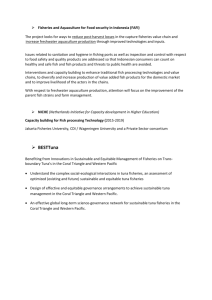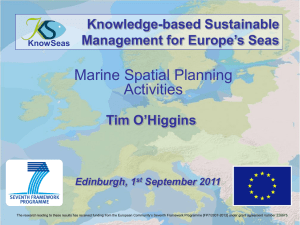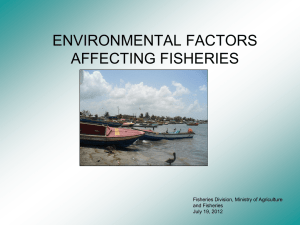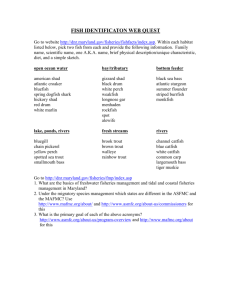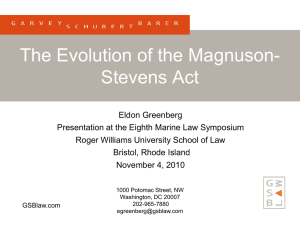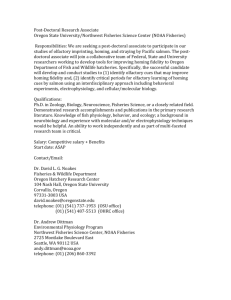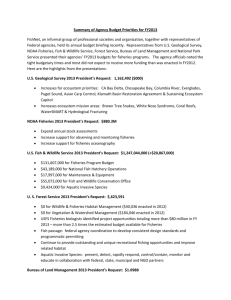Consultancy for WWF-Pakistan`s Marine Program
advertisement
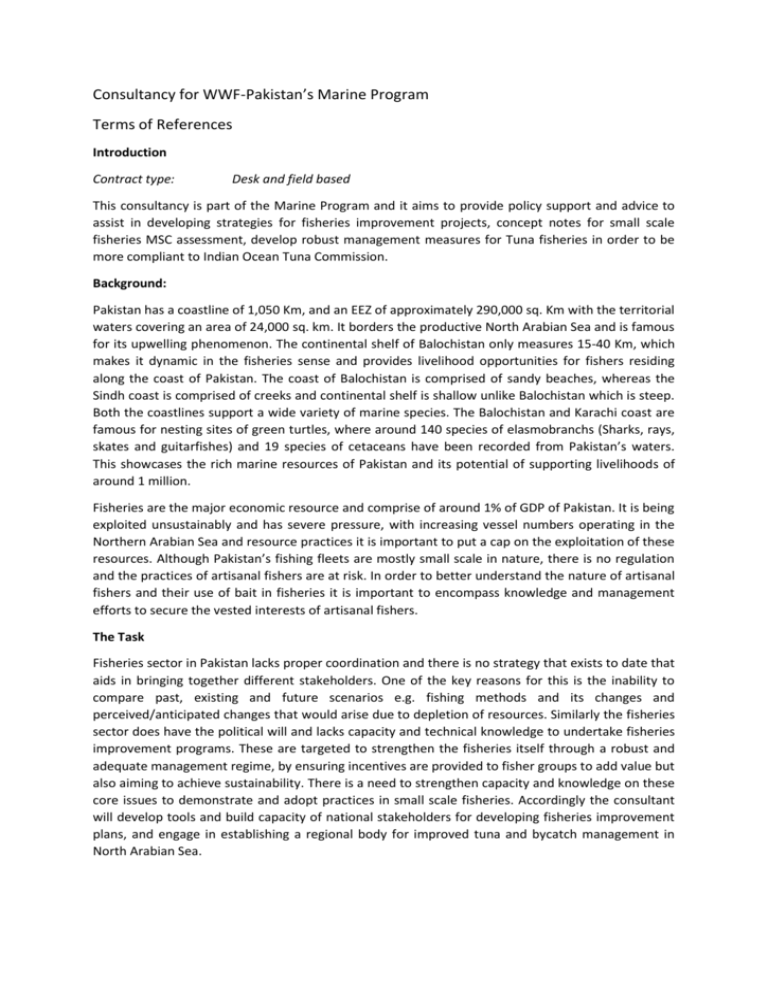
Consultancy for WWF-Pakistan’s Marine Program Terms of References Introduction Contract type: Desk and field based This consultancy is part of the Marine Program and it aims to provide policy support and advice to assist in developing strategies for fisheries improvement projects, concept notes for small scale fisheries MSC assessment, develop robust management measures for Tuna fisheries in order to be more compliant to Indian Ocean Tuna Commission. Background: Pakistan has a coastline of 1,050 Km, and an EEZ of approximately 290,000 sq. Km with the territorial waters covering an area of 24,000 sq. km. It borders the productive North Arabian Sea and is famous for its upwelling phenomenon. The continental shelf of Balochistan only measures 15-40 Km, which makes it dynamic in the fisheries sense and provides livelihood opportunities for fishers residing along the coast of Pakistan. The coast of Balochistan is comprised of sandy beaches, whereas the Sindh coast is comprised of creeks and continental shelf is shallow unlike Balochistan which is steep. Both the coastlines support a wide variety of marine species. The Balochistan and Karachi coast are famous for nesting sites of green turtles, where around 140 species of elasmobranchs (Sharks, rays, skates and guitarfishes) and 19 species of cetaceans have been recorded from Pakistan’s waters. This showcases the rich marine resources of Pakistan and its potential of supporting livelihoods of around 1 million. Fisheries are the major economic resource and comprise of around 1% of GDP of Pakistan. It is being exploited unsustainably and has severe pressure, with increasing vessel numbers operating in the Northern Arabian Sea and resource practices it is important to put a cap on the exploitation of these resources. Although Pakistan’s fishing fleets are mostly small scale in nature, there is no regulation and the practices of artisanal fishers are at risk. In order to better understand the nature of artisanal fishers and their use of bait in fisheries it is important to encompass knowledge and management efforts to secure the vested interests of artisanal fishers. The Task Fisheries sector in Pakistan lacks proper coordination and there is no strategy that exists to date that aids in bringing together different stakeholders. One of the key reasons for this is the inability to compare past, existing and future scenarios e.g. fishing methods and its changes and perceived/anticipated changes that would arise due to depletion of resources. Similarly the fisheries sector does have the political will and lacks capacity and technical knowledge to undertake fisheries improvement programs. These are targeted to strengthen the fisheries itself through a robust and adequate management regime, by ensuring incentives are provided to fisher groups to add value but also aiming to achieve sustainability. There is a need to strengthen capacity and knowledge on these core issues to demonstrate and adopt practices in small scale fisheries. Accordingly the consultant will develop tools and build capacity of national stakeholders for developing fisheries improvement plans, and engage in establishing a regional body for improved tuna and bycatch management in North Arabian Sea. Objective 1: Facilitate capacity building of relevant stakeholders to enable them to understand and participate in Fisheries Improvement Projects (FIPs) as to generate incentives to invest in the tuna fisheries sector. Activities: The objectives of the WWF-Pakistan’s Marine Program is to ensure livelihoods have sustainable fisheries management. In particular, the objective relies upon good governance, working with fisheries markets, and regional bodies. This objective will be furthered, and where possible formalised, through a high-level event in the context of the ‘Promoting Sustainable Tuna Fisheries in the Indian Ocean and Strengthening the Indian Ocean Tuna Commission’ project for implementing fisheries improvement projects with a rights based approach. The present consultancy is concerned with a workshop on the theme of consulting policy makers and relevant stakeholders for ‘Exploring and implementation of a Fisheries Improvement Project for Troll Fisheries and small scale fisheries’ such as Razor Clam fisheries to be held in early December 2015. It will therefore rely on experience convener of secretary/minister level events. The outcome will be to enlist active participation of concerned departments and ministries, obtaining commitments and practical advice on meeting realistic medium term milestones, and moving towards a robust management regime that allows Pakistan to be compliant to Indian Ocean Tuna Commission resolutions, which in the case of Pakistan is the management unit, capable to provide scientific expertise and knowledge for furthering the fisheries improvements projects to receive traction for Marine Stewardship Council Certification by 2020. Conservation moreover, cannot be achieved in solitude and will need to have concerted efforts to involve coastal country scientists, expertise and knowledge at the governance level for reforms and having allocation and harvest control rules adopted and implemented regionally with the regional fisheries management organizations. The specific details of deliverables for the present consultancy are: Specific Deliverables The consultant is expected to provide the following services deliverables, which must include but are not limited to the following: Preparation in consultation with WWF marine program of an updated database of contacts Crafting of an annotated agenda, one reflecting roles of discussants and discussion leaders Application during the event of interactive meeting facilitation methodology, designed to generate commitments supportive to medium term WWF-Pakistan marine program goals Sending and follow up of invitation letters using WWF marine program, but also for the main part relying on the consulting institution’s logo and pre-existing contacts and convening strength An end of event report annexing methodology, participant’s lists, and concept. The report will also reference specific milestones and how these have been furthered thanks to the consultant. Government endorsement of at least two FIP proposals Requirements for experience and qualifications Minimum Requirements Education: Degree in fisheries, marine biology, environmental related studies and some experience on trainings and capacity building Experience of and knowledge of fisheries sector Good understanding of fisheries related issues Excellent writing skills and fluency in English Competencies Demonstrates openness to change and ability to manage complexities Demonstrate abilities of analytical work and excellent report writing Proactive and able to work with minimal supervision and high degree of initiative, relability , flexibility, motivation and resourcefulness Professionalism, flexibility to make ad-hoc changes as and when the need arises, ability to perform under stress, willingness to keep flexible working hours Documents to be included when submitting the proposal Interested individual consultants must submit the following documents/information to demonstrate their qualifications: Proposal (i) explaining why they are the most suitable for the work, (ii) provide brief methodology on how they will approach and conduct the work Financial proposal (including fee, travel cost, (if any) and other relevant expenses) Curriculum vitae

